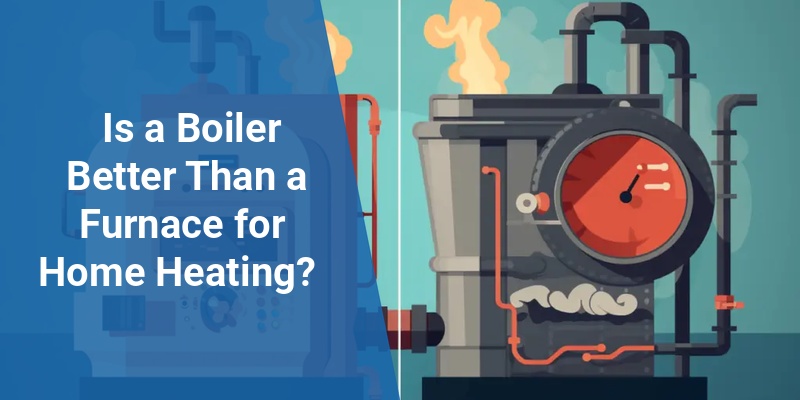Choosing between a boiler and a furnace is a common dilemma for homeowners looking to optimize home heating. Both systems have unique benefits and limitations depending on climate, home size, and personal preferences. This article provides an in-depth comparison of boilers and furnaces to help homeowners determine which heating method is best suited for their needs, focusing on efficiency, cost, installation, and comfort.
| Feature | Boiler | Furnace |
|---|---|---|
| Heating Method | Heats water to produce steam or hot water circulated via pipes | Heats air and distributes it through ductwork |
| Efficiency | Often higher efficiency, especially with modern condensing models | Varies; high-efficiency furnaces reach up to 98% AFUE |
| Installation Cost | Generally higher due to piping and system complexity | Typically lower and quicker to install |
| Heating Comfort | Offers radiant heat, often perceived as more comfortable | Heats air quickly but can cause drafts |
| Maintenance | Requires regular checks of water pressure, leaks, and burner | Requires filter changes, duct cleaning, and burner maintenance |
How Boilers and Furnaces Work
Boilers operate by heating water using fuel sources like natural gas, oil, or electricity. The heated water or steam circulates through pipes and radiators or underfloor systems, warming the home through radiant heat. Furnaces, by contrast, heat air via a burner and blow the hot air through duct systems to deliver warmth.
This fundamental difference shapes the unique heating experience from each system, influencing energy use, comfort levels, and installation requirements.
Energy Efficiency and Operating Costs
Boilers typically demonstrate high energy efficiency because radiant heat minimizes heat loss during distribution. Modern condensing boilers can reach efficiency ratings of 90-95% AFUE (Annual Fuel Utilization Efficiency) or more. Furnaces have also advanced, with high-efficiency models reaching up to 98% AFUE by recycling exhaust gases.
Operating costs depend on fuel prices and usage, but boilers often cost less to run in colder climates due to efficient heat distribution. Still, furnaces tend to heat spaces faster, which might reduce runtime for consistent heating demands.
Comfort and Heat Distribution
Boilers provide radiant heat, which is generally considered more comfortable because they heat objects and people directly rather than just the air. This creates a more even temperature with less sensation of cold drafts. Furnaces heat air, which can cause hot and cold spots and dry out indoor air.
Homes with radiant floor heating powered by boilers gain additional comfort benefits such as warm floors and silent operation. Furnaces rely on blowers and can create noise and air movement that some occupants find less pleasant.
Call 888-906-9139 for Free Local HVAC Quotes – No Obligation, Just Savings!
Installation and Space Requirements
Boiler installation is more complex and often more expensive due to the need for extensive piping, radiators, or underfloor systems. They also require ample space for tanks and piping. Furnaces are typically more compact and easier to install, especially in retrofit projects where ductwork is already present.
Choosing between a boiler and furnace may depend on the home’s existing infrastructure, budget, and renovation scope.
Maintenance and Longevity
Boilers require regular monitoring of water pressure and system integrity to prevent leaks and maintain optimal performance. Burner cleaning and annual servicing are necessary to keep boilers functioning safely and efficiently. Furnaces require filter replacement every 1-3 months and duct cleaning periodically to maintain air quality and system efficiency.
Both systems tend to last 15-30 years with proper maintenance. However, boilers generally have fewer mechanical parts prone to failure, potentially offering longer service life in some cases.
Environmental Impact and Fuel Options
Boilers often have the advantage of using diverse fuel types, including natural gas, oil, propane, or electricity. Modern boilers are also available as high-efficiency condensing models that reduce emissions significantly. Furnaces commonly use natural gas or electricity, and advancements in electric furnaces and heat pumps present alternatives for greener heating.
Understanding local fuel availability and rates is critical for evaluating environmental impact and long-term costs.
Decision Factors for Choosing Between a Boiler and Furnace
- Climate: Cold regions might benefit more from boilers due to steady, radiant heat.
- Home Size and Layout: Homes with existing duct systems favor furnaces, while those designed for radiant heating suit boilers.
- Initial Budget vs Long-Term Savings: Furnaces usually cost less upfront, but boilers might offer savings over time through efficiency.
- Comfort Preferences: Radiant warmth from boilers is often preferred by occupants sensitive to dry, forced air heating.
- Maintenance Willingness: The simpler duct system for furnaces means easier upkeep, while boilers require more technical annual servicing.
Summary of Advantages and Disadvantages
| System | Advantages | Disadvantages |
|---|---|---|
| Boiler |
|
|
| Furnace |
|
|
